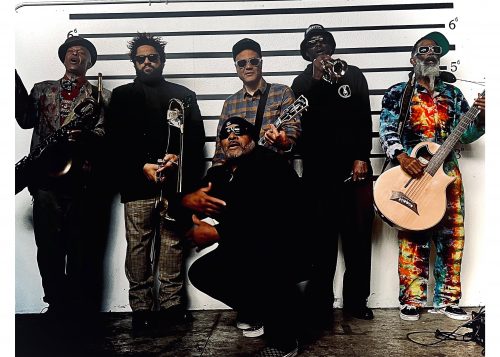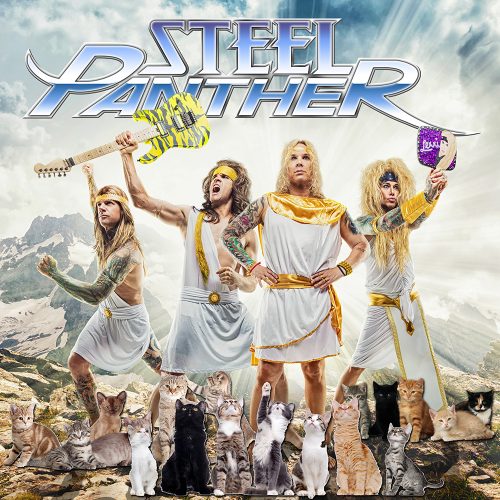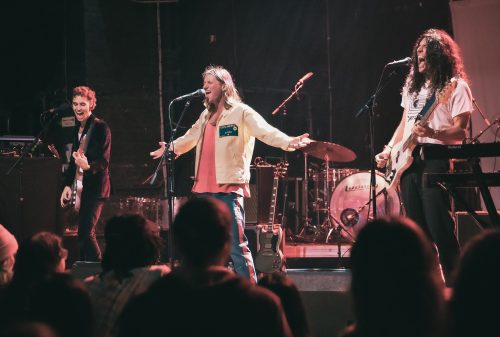Fishbone, the legendary band out of Los Angeles that has fused punk, funk and everything in between since 1979, is on a mission. As bassist and founding member Norwood Fisher puts it, it might be “the most important time in our lives except for the very beginning to be doing this.”
With four of its six members back in the fold after years of shifting lineups, the band recently released a single, “All We Have is Now,” the first time in 29 years those men recorded a song together. Later this year, they’ll release a new EP. Tour dates on the horizon include shows with Les Claypool’s Flying Frog Brigade as well as George Clinton.
Fisher chatted with us in advance of a headlining show at Gramercy Theatre on Sunday, April 23, about why the band needed a referee in the studio, early days on the LA scene with the Red Hot Chili Peppers, how alternative music blew up in the ’90s and what he hopes people are saying about Fishbone long after they’re gone.
After years of members coming and going, do you feel a sense of stability in the band now?
We’ve all strayed away for whatever time we did. Right now we just really feel the appreciation for the band. Chris Dowd who for a long time stayed away is back. I feel like now we’re a band that can ride together until we just can’t anymore.
Relationships between singers and the rest of the band can be challenging. What is the dynamic like between you and Angelo Moore?
If you saw “Everyday Sunshine: The Story of Fishbone,” you can see everything. You know, at some point it took a turn. There can be tension. But at the end of the day, it’s like family, so a family, brothers, cousins, husband, wife, whatever, there’s a dynamic, and it takes work sometimes to get from point A to point B, but we’ve done it thus far. And maybe this was the most important time in our lives except for the very beginning to be doing this. I feel, I don’t know if urgency is the right word, but there’s a great sense of purpose as of being in the space of a legacy artist and to be able to look back and look forward, and hold up people like Marshall Allen [of] Sun Ra Arkestra, right? If I gotta choice, I will be operating like he is right now; we’re going out with George Clinton this summer, dates were just posted. I knew at a relatively young age that I was a lifer.
Fat Mike produced your upcoming EP. How did that work out?
I think it was awesome with him. I’m really very happy with the end result. We’ve known each other for a long time. Fishbone took NOFX out on tour in the early ’90s and then we toured together on Warped Tour in ’96 and just did shows, mostly Warped Tour things, in the ’90s into the 2000s. So we did know each other, we always showed love and I was a fan and I am a fan of NOFX.
He was quite a capable and masterful producer overall, his track record is amazing. It was like Fishbone needed a referee, you know. … We went through a process, and the fact is that just about everyone in the band is a capable producer, so you got a lot of strong-willed knucklehead, old-ass, grumpy men that think they’re right. That’s why we need a referee.
Thinking back to the early days, how did crowds react when Fishbone first started playing shows?
We came to the stage with a lot of energy from all our influences, the major influences, what it seemed like it was supposed to be about, right? When you think about the greatest shows ever: The Mothership landing (George Clinton and Parliament Funkadelic), I never saw Kiss live but I was in awe of them on the television appearances, David Bowie and Jimi Hendrix, and then as we were getting to see like The Specials on “Saturday Night Live.” And we really took that to heart. We wanted to put holes in the stages and literally move the stages, which we did, and move the crowd. So when we hit the stage, the crowd moved. But mostly because we were in front of audiences that were right for what we were doing.
The Red Hot Chili Peppers seemed like comrades in those early days.
Absolutely. I remember seeing the advertisements for their first shows in the LA Weekly, which was the local paper that everyone looked to. We had never even played in a club yet. We were teenagers, 17, 16 years old, kind of figuring out how do you get to play a club? We didn’t know what to do (laughs). We knew we were too young to get into the club. We didn’t know about all-ages shows and whatnot. There was some intrigue, the way they were written about. There was anticipation for their shows.
It took a while before we actually encountered each other, and I very vividly remember Anthony [Kiedis] and Flea coming together to see Fishbone at Club Lingerie. We were onstage and performing and I saw they come in the door. I had never met them but I knew who they were. I couldn’t even see them clearly, just a silhouette, but oh, the dudes from the Chili Peppers (laughs). And afterwards they came up and they were just cool as fuck. Very quickly, Flea was like, “Let’s jam.” And that’s what we did. Me, Flea, Hilal [Slovak] and my brother came to my mom’s place where we would rehearse in the bedroom. They came over, plugged in and jammed, and we did that quite a few times.
Fishbone was on the Lollapalooza tour in 1993 with Alice In Chains, Tool, Priums and others. Pearl Jam, Nirvana and Soundgarden had already broken through. Did you get a sense that “alternative music” was crossing over?
Absolutely. Everything, like most of the things that we revered, were building and building and building. Through the ’80s we watched X become this massive band. Things that were challenging and quirky got big. Talking Heads and The B-52’s, I don’t know if anyone could predict those successes when I think about it. The timing was right for that type of energy, and obviously the ground was paved by David Bowie pushing the envelope and in another sense Frank Zappa and Parliament-Funkadelic, eventually Prince by the time he got to “Dirty Mind” made these statements. That paved the way for people to be open to stuff. So yeah, like we watched people grow and New Wave got really big, we were part of something that wasn’t New Wave, it was more to do with punk and it wasn’t exactly like Fear or the Dead Kennedys, maybe Bad Brains was the band, there were other bands like a Gang of Four that straddled the line of punk and funk; The Clash mixed shit up a lot but was considered a punk rock band. The Clash was exploding. So there was these things that had happened that kind of laid the groundwork as the whole scene, the Red Hot Chili Peppers, Jane’s Addiction and everyone else that kind of came up. The whole scene was moved forward.
You mentioned legacy earlier. What do you hope the legacy of Fishbone is 30 to 40 years from now?
I hope they stay that along with staying true to the original intentions of their roots, the band continued to expand creatively and forged new territory.




Leave a Reply